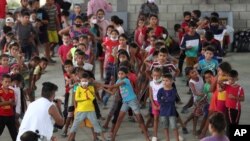The U.N. World Food Program says it has reached a deal with the Venezuelan government to provide daily school meals to 185,000 of the country’s most vulnerable children by the end of the year.
The deal was sealed with a handshake by WFP Director David Beasley and Venezuelan President Nicolas Maduro Monday in the capital, Caracas. The school feeding program initially will take place in areas where food shortages are most severe.
But, WFP spokesman Tomson Phiri says his agency aims to expand the operation over the coming two years to reach 1.5 million students, who often miss out on meals during the day. He says the operation will be conducted without state interference.
“Our school meals program will be independent and separate from the national social protection programs," said Phiri. "In Venezuela and across the world, WFP’s operations follow the humanitarian principles of humanity, neutrality, impartiality, and operational independence.”
Past efforts by WFP to provide food assistance to Venezuela’s hungry have been rebuffed. Opposition critics have accused the government of wanting to control aid distribution and using it as a political tool, a claim denied by Maduro.
In finalizing the agreement, WFP Director Beasley thanked Maduro for allowing his agency to be independent and free of politicization.
Venezuela has been in economic free-fall for years. The United Nations reports 5.6 million people have fled the country because of political repression and economic hardship.
A World Food Program assessment of conditions in the country finds one in three Venezuelans are food insecure and in need of assistance. This includes 2.3 million people who are severely food insecure and do not know from where their next meal is coming.




